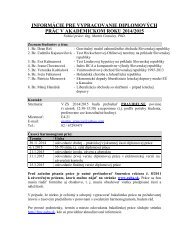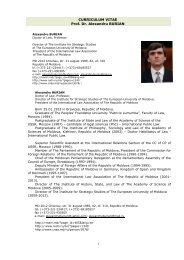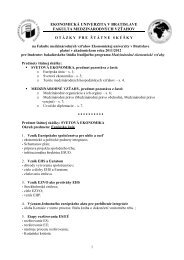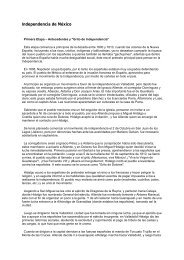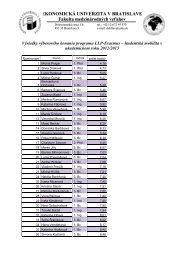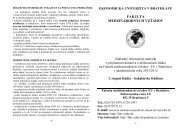eject it), but he favours the monetary policy. He states that in the long term the central bankshould accept the credibility policy of a controlled inflation with the aim of increasinginflationary expectations to reach the decrease in real interest rates and the ensuing growth ininvestments. The BOJ should set a target level of inflation in a long term (approx. 4%) and dothe utmost to achieve it, i.e. to run standard open market operations, non-standard operationswith long-term bonds and unsterilized interventions. 31 If the liquidity trap is seen as a problemof surplus of savings to demand for investments, monetary expansion should lead also tocurrency depreciation with positive impacts on net export. Nevertheless, Krugman also pointsout that the necessary export of capital is prevented by taking account of the fact that theexchange rate is expected to return to the “normal” level, i.e. future appreciation. 32Krugman´s proposals were accepted by American and Japanese economists, the BOJ,however, rejected them at the beginning arguing that it was not easy to set a certain inflationarygoal. The BOJ was also worried about a potential loss of control in case of inflation. Moreover,growth in nominal interest rates resulting from higher inflation (or inflationary expectationsrespectively) would eliminate the effects of decreased real rates. Furthermore, JPY was notdesired regarding the relations with business partners. 33In 1996-1998 prices started to grow slowly again and worries about a deflationaryspiral decreased. But the decrease in prices continued after 1999. Thus deflation became animportant factor for further development of the economy and according to some authors it wasthe cause of the ensuing crisis. One speaks about a so-called deflationary recession or adeflationary-recession spiral.2.2 Deepening imbalance of public finances and starting crisis of financial systemFiscal expansion of the 1st half of the 1990s led to a partial recovery of the economy,but also to a substantial worsening of the state of public finances. Public expenditures grewfrom 31.6% of the GDP in 1991to 36.8% of the GDP in 1996. On the contrary, in the sameperiod receipts to budgets fell from 33.3% to 31.7% of the GDP. In 1992 Japan still showed asurplus of public budgets. From 1993 on, however, Japan started to have deficit budgets, thedeficit grew every year and in 1995 the deficit got above the 5% of nominal GDP and above theaverage of OECD countries. Gross public indebtedness grew to 95% of the GDP in 1996 – seetable 3. A higher rate of indebtedness was recorded only in 3 OECD countries in that year(Canada 102%, Belgium 133% and Italy 128% of the GDP).The indebtedness started to grow rapidly in the time, when the country was facingaging of its population and therefore decreasing tax revenues and growing expenditures intopensions and health care in the future. Nevertheless, at the beginning, the public debt was notthe money supply and aggregate demand. Only expansive fiscal policy can ensure the recoveryof economy. For more details see e.g. Mach, M. (2002): Makroekonomie II, p. 75, 83-87.31 Krugman, P. (1998): It’s Back: Japan´s Slump and the Return of the Liquidity Trap.32 For more details of theory of exchange rates see e.g. Neumann, P., Žamberský, P., Jiránková,M. (2010): Mezinárodní ekonomie or Taušer, J. (2007): Tradiční teorie měnového kurzu vpodmínkách ekonomické transformace, in: Ekonomický časopis, 2007/9.33 There is a lot of criticism of a liquidity trap theory and Krugman´s concept. E.g. B. Powel(2002: Explaining Japan´s Recession, p. 40) states that his recommendations were inefficient.This could be seen during the recession in 1998, when the BOJ and MOF purchased private andgovernment securities. They held up to 53% of all government bonds. Even though the amountof Money in the economy (Money base) increased and JPY depreciated, the economy stayed inrecession.According to other representatives of a so-called Austrian schol the whole antideflationarypolicy is unjustified and harmful as it leads to inadequate redistribution andboosting of recession. According to e.g. J. Šímy (2007: Deflace – definiční znak zdravéekonomiky) deflation is a “defining sign of a healthy economy.“MEDZINÁRODNÉ VZŤAHY, 2012, 4 ○ 139
seen as an important risk, since in net expression it reached only 29.3% of the GDP in 1996(after deduction of state debts to other stakeholders). For example Italy faced a net debt of104% of its GDP and Belgium even 115% of its GDP. 34 Japanese public debt is quoted in yensand in the mid-90s more than 90% of the debts were held by domestic stakeholders. Hencefrom the view of Japanese government the problem “was still at home”. Paradoxically, the statebecame not only a debtor, but also its own creditor, as public institutions held more than a halfof state bonds in the long term, e.g. in 1996 it was 61%. 35 Nevertheless, budget deficits and fastgrowing indebtedness of Japan became subject to widespread criticism from renowned ratingagencies and international institutions. It was partially their contribution that in 1997 thegovernment approved strict, nevertheless too early measures for consolidation of publicfinances.Table 3: Japanese Public Finances in 1990-2000, % of nominal GDPItem 1990 1991 1992 1993 1994 1995 1996 1997 1998 1999 2000Public budgets balance 2,1 1,8 0,8 -2,4 -4,2 -5,1 -5,1 -4,0 -5,8 -7,4 -7,6- OECD average -2,9 -3,6 -4,5 -4,9 -4,2 -4,0 -3,1 -1,7 -1,3 -0,8 0,2Gross public debt 68,6 64,8 68,6 74,7 80,2 87,6 95,0 101,6 114,3 128,3 136,7- OECD average 54,2 55,9 59,3 63,7 65,2 70,1 72,2 72,5 73,0 72,4 69,6Net public debt 26,1 13,3 13,3 18,1 20,8 25,0 29,3 34,8 46,2 53,8 60,4- OECD average 33,9 33,7 33,7 40,3 41,7 42,6 44,5 44,3 44,2 41,6 38,6Source: OECD (2007): OECD Economic Outlook, No. 81, p. 265, 270, 271.Further threat was a problem of commercial banks and other financial institutions,lasting since the bubble dissolution in 1991. Due to economic stagnation many businesses werenot able to pay high debts from the period of a bubble boom. Moreover, the value of mortgages,i.e. real estates was declining. Undercapitalized financial institutions recorded higher and higherlosses and a growing volume of so-called non-performing loans (NPLs). Japanese central bankgenerally defines these loans as loans, where banks do not receive the planned instalments ofthe capital and interests and their economic value is declining under their accounting value.Thus there is a risk, that in future banks will not be able to reimburse the costs of the loan fromtheir yields and will themselves be threatened by a lack of resources.While in 1992 the total volume of NPLs stated by the BOJ was JPY 1.6 trillion, in1994 it was JPY 5.2 trillion and in 1995, it was already JPY 13.4 trillion 36 In October 1994 forthe first time governor Mieno publicly informed about the need to solve this issue, however,without any adequate response of the government.In 1995 for the first time the Prime Minister Murayama´s government had to intervenepublicly in favour of mortgage companies (jusen) 37 and credit co-operatives, which investedinto real estates during the bubble and now were close to bankruptcy. Overall losses of thesenon-banking institutions reached JPY 6.4 trill. in 1995. As jusen were closely connected withother businesses (particularly in the country), it was also a political issue and so the government34 OECD (2007): OECD Economic Outlook, No. 81, p. 263, 264, 270, 271.35 Statistics Bureau (2008): Historical Statistics of Japan.36 BOJ (2002b): Japan´s Nonperforming Loan Problem.37 Jusen are non-banking companies founded by banks and other financial institutions in the1970s to complete their offer of loans on housing for households. In the 1980s they started tolend high loans not only to households, but also to real estates companies. Their total lossesfrom speculative trading were so high during the bubble, that their founder´s banks were notable to reimburse them. Their problems were described first in 1993. For more details see e.g.Nakaso, H. (2001): The financial crisis in Japan during the 1990s: how the Bank of Japanresponded and the lessons learnt.140 ○ MEDZINÁRODNÉ VZŤAHY, 2012, 4
- Page 2 and 3:
Medzinárodné vzťahyVedecký čas
- Page 4 and 5:
ObsahPôvodné vedecké článkyZEN
- Page 6 and 7:
ContentOriginal scientific papersZE
- Page 8 and 9:
P Ô V O D N Ý V E D E C K Ý Č L
- Page 10 and 11:
epublikou a Indickou republikou? Za
- Page 12 and 13:
spočiatku javí iba ako malá sekt
- Page 14 and 15:
Z kulturologického hľadiska tento
- Page 16 and 17:
6. LEHMANNOVÁ, Z. a kol.(2010): Pa
- Page 18 and 19:
krajiny 2 . Zatiaľ čo pri cle pla
- Page 20 and 21:
Textilv ekonomike (P SA /P TA ). 7
- Page 22 and 23:
TextilGraf 3: Účinky subvencií n
- Page 24 and 25:
TextilGraf 4: Účinky subvencií n
- Page 26 and 27:
TextilAnalyzujme teraz rozdiely v d
- Page 28 and 29:
P Ô V O D N Ý V E D E C K Ý Č L
- Page 30 and 31:
dohody, ktorú členský štát uza
- Page 32 and 33:
Na základe návrhu Európskej komi
- Page 34 and 35:
do svojej výlučnej kompetencie, n
- Page 36 and 37:
6. Stanovisko Generálneho advokát
- Page 38 and 39:
a jadrovým programom. Takmer úpln
- Page 40 and 41:
Južná Kórea sa ďalej rozvíjala
- Page 42 and 43:
Napätie medzi obomi štátmi na K
- Page 44 and 45:
Graf 2: Štruktúra tvorby HDP KĽD
- Page 46 and 47:
a luxusného tovaru. Rada bezpečno
- Page 48 and 49:
Osobitnú skupinu ŠEZ tvoria zóny
- Page 50 and 51:
systému na potraviny a iný priemy
- Page 52 and 53:
7. SINGH, L. 2012. India and North
- Page 54 and 55:
D I S K U S I AVÝVOJ MULTILATERÁL
- Page 56 and 57:
chybět příslušné pravomoce k u
- Page 58 and 59:
socialistickou federativní sověts
- Page 60 and 61:
uzavírat bilaterální dohody mezi
- Page 62 and 63:
2 Stěžejní multilaterální obch
- Page 64 and 65:
Pod záštitou UNCTAD byl během ro
- Page 66 and 67:
Celní úmluva ATA karnet pro doča
- Page 68 and 69:
těchto práv jednotlivými státy
- Page 70 and 71:
zejména na nastolování obchodu v
- Page 72 and 73:
33. ORGANISATION FOR ECONOMIC CO-OP
- Page 74 and 75:
D I S K U S I AFAKTORY ROZVOJA A RA
- Page 76 and 77:
tradície a pomerne ľahko sa dost
- Page 78 and 79:
1979 ajatollách Chomejní povolil
- Page 80 and 81:
moslimských krajín - vytvárať n
- Page 82 and 83:
nachádzali v Pakistane, kde v úlo
- Page 84 and 85:
jedna skupina argumentuje množstvo
- Page 86 and 87:
28. OLCOTT, M. BRILL (2012). Centra
- Page 88 and 89:
planéty Zem, je možné identifiko
- Page 90 and 91: vysokohorských ľadovcov a snehove
- Page 92 and 93: populácie človeka. Len v roku 200
- Page 94 and 95: s tým sú „tiché“ krízy spô
- Page 96 and 97: druhov rastlín alebo globálne ote
- Page 98 and 99: 10. MACGRANAHAN, G., BALK, D. , et
- Page 100 and 101: D I S K U S I ASÚČASNÉ A OČAKÁ
- Page 102 and 103: v Afrike, keďže Maurícius nedisp
- Page 104 and 105: v Baoaré. Krajina patrí medzi naj
- Page 106 and 107: nadmerné znečistenie vody v Čín
- Page 108 and 109: ZÁVERPredkladaný článok analyzu
- Page 110 and 111: D I S K U S I AŠPECIFIKÁ POSTAVEN
- Page 112 and 113: stálym obyvateľstvom, definovaný
- Page 114 and 115: občianstve, ktoré zakladajú prim
- Page 116 and 117: Špecifické a nezameniteľné post
- Page 118 and 119: dochádza v prípadoch exilových v
- Page 120 and 121: P R E H Ľ A DPROBLEM OF EASTERN PA
- Page 122 and 123: countries where the development of
- Page 124 and 125: In the Joint Declaration it was sta
- Page 126 and 127: On the partners’ side we see that
- Page 128 and 129: espect for ordinary citizens of the
- Page 130 and 131: P R E H Ľ A DJAPAN´S LOST DECADE:
- Page 132 and 133: often called a “bubble boom” or
- Page 134 and 135: investments into properties - see t
- Page 136 and 137: Ongoing appreciation of the currenc
- Page 138 and 139: usinesses etc.) as well as by long-
- Page 142 and 143: was bound to take steps. Many other
- Page 144 and 145: preferences. Massive fiscal incetiv
- Page 146 and 147: end of 1998. 55 The crisis also dee
- Page 148 and 149: The central bank also responded to
- Page 150 and 151: 4. CALLEN, T. - McKIBBIN, W. J. (20
- Page 152 and 153: 1, February 2001. [20.3.2008.] Avai
- Page 154 and 155: P R E H Ľ A DINŠTITUCIONÁLNE MOD
- Page 156 and 157: zahraničného obchodu s Nemeckom (
- Page 158 and 159: diplomacie v podmienkach, keď real
- Page 160 and 161: organizačnej matice sú: ministers
- Page 162 and 163: neprítomnosti ďalších pilierov
- Page 164 and 165: oddelenia, sú v rámci veľvyslane
- Page 166 and 167: ktorý aplikuje Nemecko. V tomto mo
- Page 168 and 169: ZÁVERModely organizácie hospodár
- Page 170 and 171: 20. TÓTH, Ľ. - HORVÁTHOVÁ, K. (
- Page 172 and 173: podmienky. Od sedemdesiatych rokov
- Page 174 and 175: 1 Tradičné teórie medzinárodný
- Page 176 and 177: okolitých štátov. Násilné pres
- Page 178 and 179: 1.3 NeorealizmusRealistický smer s
- Page 180 and 181: a morálnosti. Teroristické a extr
- Page 182 and 183: 17. NYE, Joseph S. (2004): The Bene
- Page 184 and 185: právnom rámci, ktorý poskytne od
- Page 186 and 187: Tretím a posledným princípom je
- Page 188 and 189: III.IV.s adekvátnou ochranou vodn
- Page 190 and 191:
Podľa princípu spravodlivého a r
- Page 192 and 193:
POUŽITÁ LITERATÚRA:1. BENCALA, K
- Page 194 and 195:
1 Funkcia ropného trhuPodľa zákl
- Page 196 and 197:
neštandardné pohyby cien v roku 2
- Page 198 and 199:
forwardových obchodov, kde je kaž
- Page 200 and 201:
Idea konceptu racionálnej špekul
- Page 202 and 203:
5. GRANČAY, M.: Hypotekárny trh U
- Page 204 and 205:
chrobáky a červy považujú za v
- Page 206:
INŠTRUKCIE PRE AUTOROVPríspevky d



